
{kiosq_button:center}
Alice Towers has had a whirlwind experience in professional cycling.
In just two seasons, she has won the elite women's title at the 2022 British Championships, represented Team GB at the 2022 UCI Road World Championships in Wollongong, signed a three-year contract to compete on the Women's WorldTour with Canyon-SRAM and has competed in some of the biggest bikes races, from Paris-Roubaix to the Tour de France Femmes.
The jump into the deep end of the sport where she is competing alongside the best in the world might have left some riders feeling the pressure to perform, but Towers seems grounded by her new experiences.
In several interviews with Cyclingnews during the 2023 season, Towers has said that with the support of her family and team, she's been given the time to develop, learn and grow slowly.
While Towers aims to become one of the best riders in the world in the future, she said she continually reminds herself that, at just 21 years old, it was not that long ago that she was a full-time student. Part of what keeps her on a firm footing is taking the time to appreciate just how far she's come in such a short period.
Cyclingnews: How did you get involved in cycling?
Alice Towers: I've been riding for ages and ages, since I was about ten years old. It's just a classic story, really. My family rides. I just rode with my family on the weekends and then only started racing when I was about 15 and 16. Some people have been put on a bike, and they've been doing races since they were four and five years old. I came into it late, even though it's still young. I started racing in the national series in the UK. There's quite a good national series that goes on around the country.
I did pretty well. I never trained for the races, which was quite good, but I was still at school and didn't know what I wanted to do after school and stuff. I'm quite easygoing. I didn't have a plan or think about it too much.
I was a junior in 2020. And that's when we went into lockdown. And I don't need to say much about that. So I was still at school then, and school got cancelled, and I had loads of free time and then that was when I discovered my love for cycling because I basically became a full-time cyclist. I didn't have to do school anymore so, my whole day was going out for rides, and that was when I realised I'd love to keep doing this full-time. I didn't want to return to school, university, or studies.
That was when my brother [Lucas] raced in Spain for a Spanish team. I got a contract to ride for a UCI team [Eneicat-RBH Global, 2020] when I was still a junior in 2020. Then, I got to go to the La Perigord Ladies race in August 2020. That was my first race of the year and my first-ever UCI race when I was 17.
It was good, actually, and the team was good. It was just a small team. I realised I'd love to do this full-time. I got a contact with Drops [Drops Le Col p/b Tempur], signed for 2021, and then did my first season in Europe. It went on from there. It hasn't been too long since then. It's all happened quite quickly.
A family sport
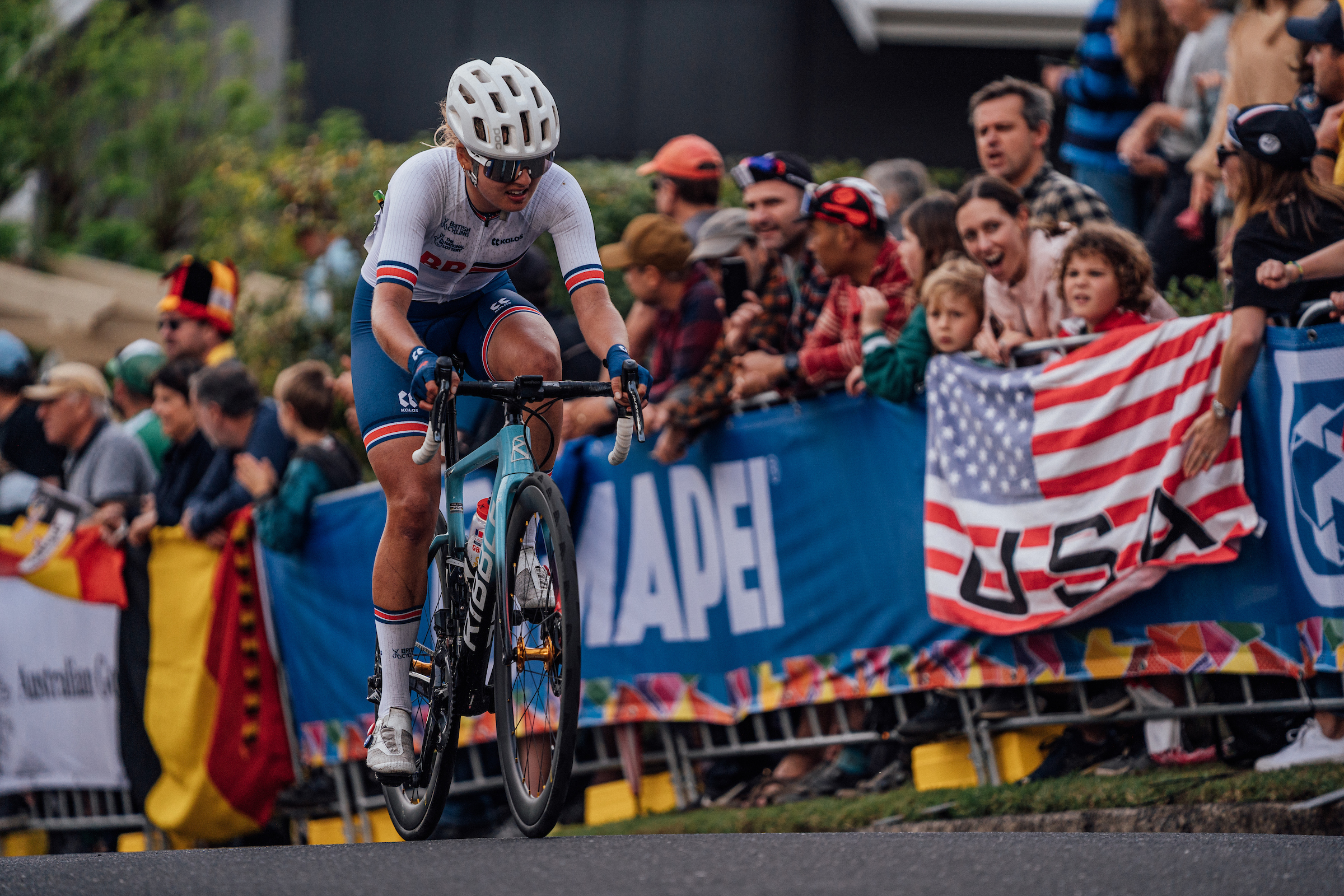
Alice Towers racing for Team GB at the World Championships in Wollongong
CN: Could you tell us about your family?
AT: My dad [Jonny] used to race, and he always used to ride with us when we were younger. My brother lives in Spain and rides for the Caja-Rural-Alea under-23 team. He had a good season in Spain last year, and he's riding for them for under-23 this year. He's a year younger than me. And it was nice because me and my brother were always close in age. So, we grew up together riding, and we both do it full-time now. So yeah, that's cool.
It was mainly just a family thing. And it wasn't training, at first. We just used to ride to the cafe and just eat cake. It was very relaxed and very unstructured.
If it were raining or cold, we wouldn't ride. It wasn't like my dad was cracking the whip on me and my brother and saying, like, 'Come on guys, you have to get out today'. We did it because we liked it. That's why I still love cycling now because I was never burnt out when I was younger.
There are a lot of kids that absolutely smashed themselves when they were like 15 or 16, and they put pressure on themselves. And now when they're like 18, 19, 20, they've lost the love for it a bit. For me, my love for cycling and racing kept growing and growing.
CN: Could you give us an example of a memorable ride you did when you were 15 or 16 years old?
AT: A three-hour ride. I remember doing my first 100-kilometre ride, and I was like, 'Wow, three digits.' One hundred kilometres was a massive day out that back then.
CN: Did any of your friends from school ride too, or did they know that you were cycling in your free time?
AT: Everyone knew I rode, but I don't think anyone realised how seriously I took it. Cycling is not a common sport at school in the UK. It's not something you do with your friends or at school. So they probably thought, 'Alice just goes out and rides a bike,' but I don't think they realised how seriously I wanted to take it.
CN: How would you compare your youth cycling experience with the Backstedts, another well-known cycling family in the UK?
AT: Zoe is absolutely insane. I think everyone has their own path. I definitely didn't have the normal path compared to everyone else. I came into it late, and Zoe's been at the top of her category for years and probably will still continue to be. In the UK and the cycling communities, there are a lot of families that do it. The whole family will be cyclists: Mum, Dad, brother, and sister.
There's my family, the Backstedts, the Hayters, there's loads of families riding. In the UK you get little clusters of families that are all cyclists and you will go to the races together; the brother will do the under-16 race and then the little girl will do the under-12 race and then mum and dad will chat with the other parents. That's why there are a lot of sibling pairs in British British Cycling because it's a very family thing.
CN: Tell us about your first big race experience at Perigord.
AT: I hadn't raced for ages because we were all in the COVID lockdown, and everything got cancelled, but I remember thinking that there were so many people, the bunch was massive, and it was so fast, and I was a bit overwhelmed.
My team was Spanish. I don't speak Spanish, and the race meeting was in Spanish. The DS spoke a little bit of English, and all he told me was to just my own thing. So, that's what I did.
It was quite a hard race. Well, it was hard for me back then. I finished in the front group. It was a nice introduction to racing. There was no pressure. No one knew who I was. It was just a nice introduction.
In 2021, I already knew what was in store for me. I started my season as a first-year under-23 and knew the level and how it worked. So, it wasn't like I was completely chucked into the deep end.
CN: Was your brother already overseas racing?
AT: He spent my last couple of seasons in Spain. He rode for a Spanish team in Lyon, Spain, as a junior. And then, last year, he rode for an amateur team in Spain and did well and joined the Caja Rural under-23 team. He's living in Pamplona at the moment. But, racing in the Spanish scene first is quite a good pathway to the top because many young British riders go to Italy, France, or Spain.
CN: Racing in Spain somehow led you back to the British scene racing with La Col-Wahoo for two years. What was it like racing with this programme?
AT: The team was nice because it was a British team. And it felt comfortable and familiar. And the girls are not just teammates, but we're all friends. So it was it was a nice environment. And they were there was no pressure, but the team was very ambitious as well. So I think without realizing it, your goals got higher and higher. The team was very ambitious and punched above their weight and in a very good way. They got into good races. We did some Classics and then some stage races. So I had a taste of everything. There was no better place and no other team I would have rather been on for those first two years of my career.
Joining the list of national champions
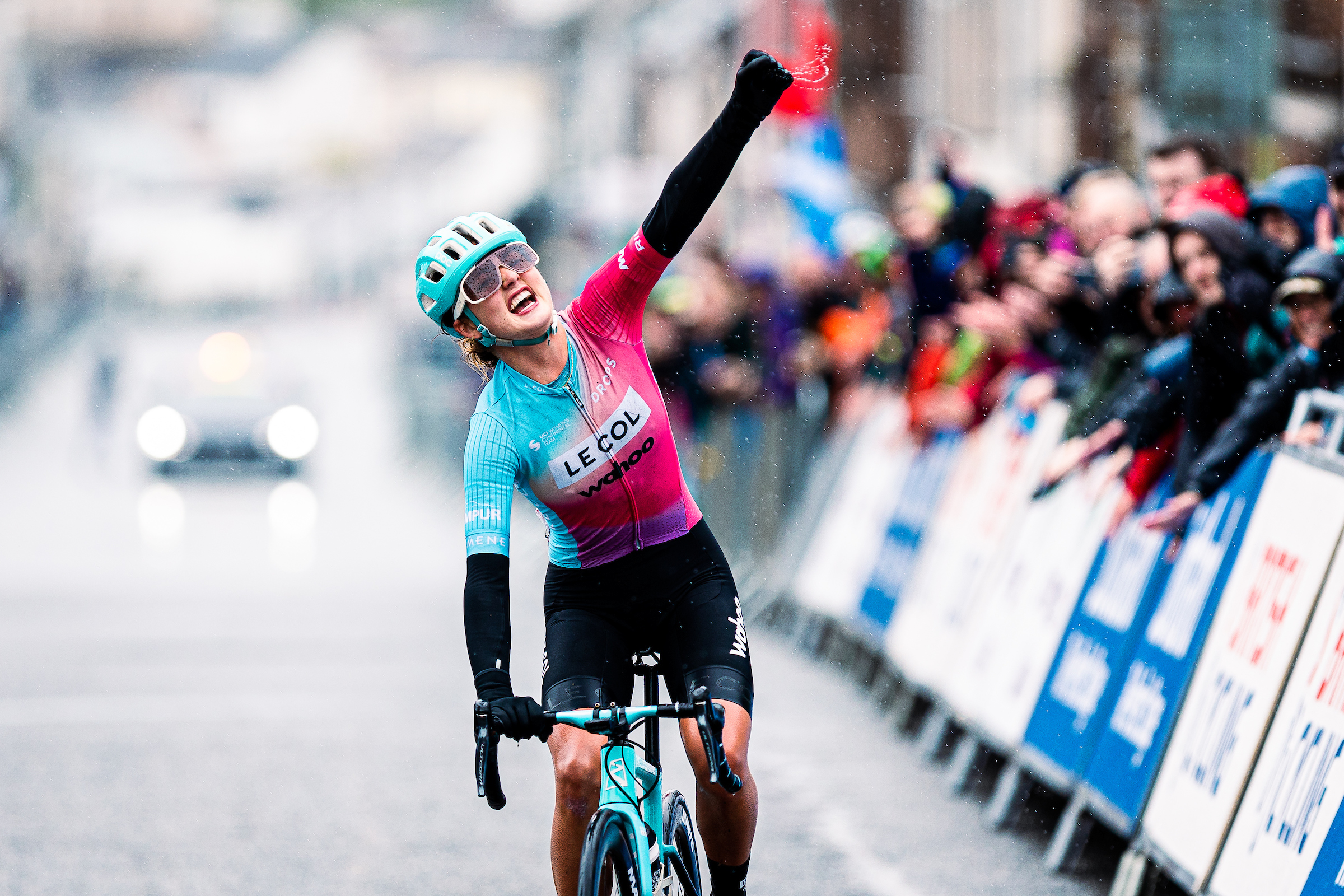
Alice Towers, while racing for Le Col-Wahoo, wins the elite women's road race title at the British National Championships in 2022
CN: Could you walk us through your shock victory at the British Championships in 2022?
AT: Racing in Europe was very competitive and a high-level environment to perform in, and when we came back to the UK for nationals, we had quite a few girls there. We had the most numbers on any one team and, with that, some of the strongest girls in the race. The plan wasn't necessarily to go for me; it could have been anyone, but we would use those numbers and the knowledge and the experience we'd have racing out in Europe and apply it to racing the nationals in the UK. We had all the bases covered. We rode as a team because we'd been practicing when in Europe. And it paid off well.
When I made the move, that was the first move we tried. We would just keep trying with all the different riders. It just happened to be the move that stuck, and I'm glad that I could have pulled it off for the girls, and then yeah, they did a really great job behind as well.
I watched the race back, and they had everything covered behind. So yeah, it was nice to be part of such a strong team that day and pull it off for the team.
CN: What was going through your mind while winning the national title?
AT: When I first went, I wondered, 'Why'd I do this?' The top 40 pros were left, and I was out there on my own. I looked around, and there was no one with me, and it was windy and cold. My legs felt good, and I thought that if I got caught, I just wasted it. But I thought, 'I'm out here now; I may as well just pace it to the end. I didn't want to blow and I didn't want to go too hard.
You don't have any radio or much communication in the national championships so I was oblivious to what was happening behind me, which was good because I could only focus on what I was doing. I was controlling the things I could control, making sure I was eating plenty, drinking a bottle a lot, and just keeping my head down, and yes, I just got closer and closer.
It was only about five kilometres to go when I thought, 'I'm gonna do this. I'm gonna make it to the finish by myself. The time checks didn't come very, very often. There was quite an open course, and I couldn't see anything, so I thought the gaps were pretty solid.
It was a very special day. My family was also there because they didn't see me race in Europe at all because we're all over the place usually. So yeah, it was really nice to have everyone there and everyone at the finish line.
CN: How did your family react to that win?
AT: They were really happy. There were a few tears. My brother raced the men's race straight afterward, and his race started 20 minutes or something after mine ended, but he was so focused on my race. He was still in his tracksuit pants, and I was like, 'Lucas change. You're on the start line in 15 minutes'.
CN: How do you feel about joining the history book of national champions?
AT: It's pretty cool. It definitely gave me a confidence boost afterwards, and it will always be something special. You know, my name is gonna be on that list somewhere. And that's pretty special.
Learning from the best
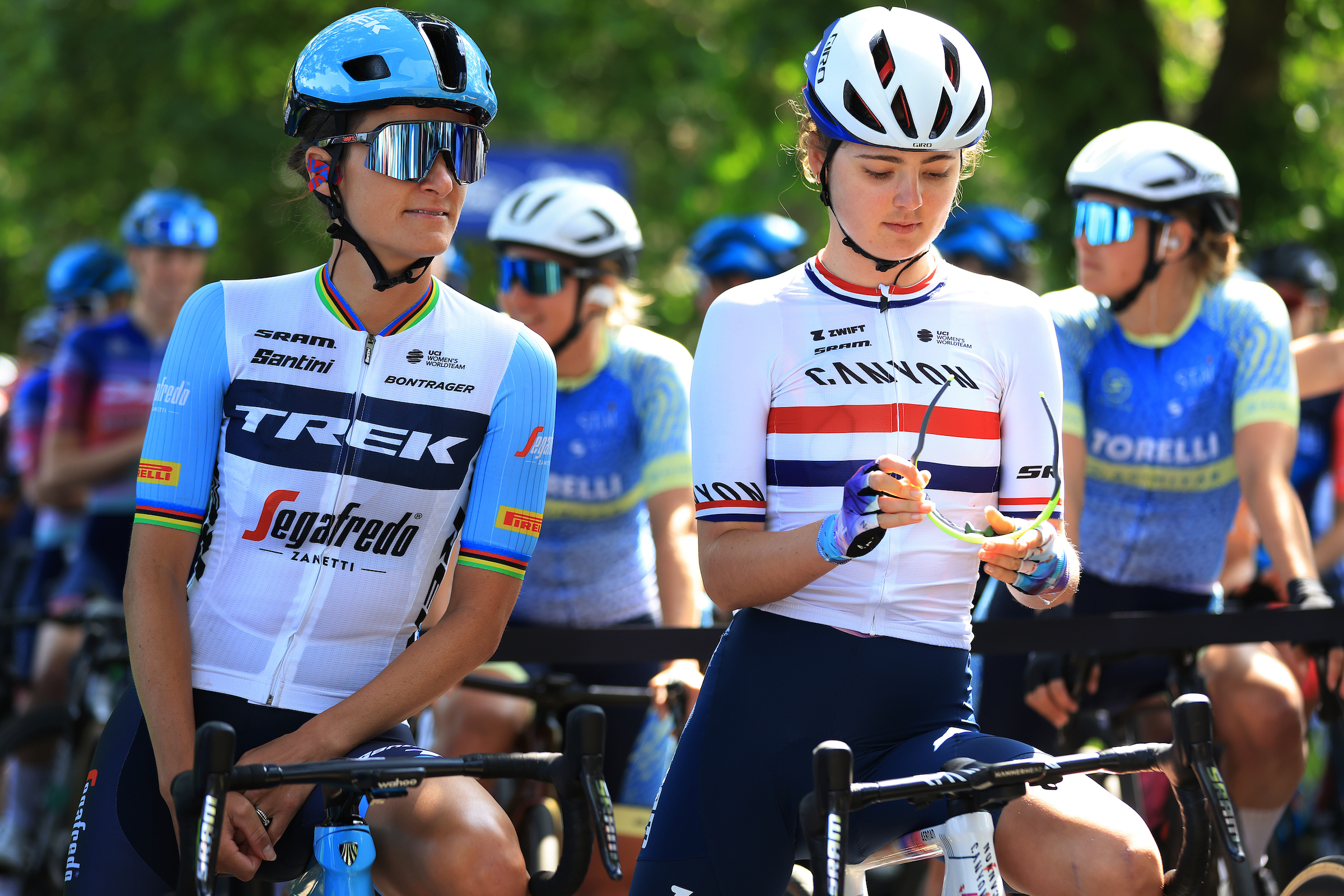
Alice Towers (Canyon-SRAM) and Lizzie Deignan (Lidl-Trek) line up at RideLondon Classique in 2023
CN: What would you say your strengths are in cycling?
AT: I'm still trying to figure it out. I enjoy stage races because I don't fatigue too quickly, and I like long, hard races that are all day with the pressure on. I'm still trying to figure it out. I'm not a sprinter. Over the next two years, I'll explore what type of rider I can be and what my strengths are. I'm now in quite a stable environment for the next few years. So I'll explore that a bit more.
CN: You didn't take the Team GB route as a youth rider. Why not?
AT: The first time I got my hands on a Team GB national jersey was at the World Championships [Wollongong 2022]. I didn't go through the [youth] programme in the UK. There's a very specific GB Academy route, which is quite track-focused. Everyone knows each other inside the programme. Now that I've been with the staff, I've gotten to know the team more, and hopefully, I'll have a bit more to do with the national team. I'd love to represent my country again because that was one of my main goals.
CN: You landed a three-year contract with Canyon-SRAM, of which you are in your first year. How did that come about?
AT: After I won nationals in 2022, Ronnie [Lauke], the team manager, contacted us, and we talked a little bit, and he offered me a contract. I was a bit taken aback. I signed it early in July of 2022, which was nice to have something in place for the rest of the year and to have a three-year contract. It helps to know that I've got security through 2025 and the trust in a team. They believe in my development.
CN: Do your parents help with your contract negotiations?
AT: I don't have an agent. My dad does help me with a lot of things. He was in on the meetings and is kind of like my agent. He sorts out many of those things for me and knows about contracts, negotiations, etc. We managed to negotiate the deal without that third party.
CN: What was it like when you first met your Canyon-SRAM teammates, and team leaders like Kasia Niewaidoma?
AT: It was pretty cool. She's been one of my inspirations for the past couple of years. It's always weird when you meet someone that you've looked up to. I was excited to be a teammate to people I look up to and be around people who inspire me. It's important because I feed off of other people's energy. Being surrounded by people I look up to will make me aspire to do bigger things throughout the next couple of years.
CN: Are Canyon-SRAM supportive of your development?
AT: I've always said I like to take things a year at a time, so by the end of the three years, I want to have improved a lot and be competitive and in all of the top races, but I think I'm still trying to figure out what sort of rider I am and stuff like that. All I can do is keep developing and keep getting stronger. I don't like thinking too far into the future.
CN: How has your first season with Canyon-SRAM gone?
AT: It's gone good. It's been smooth, and the team has made that transition smooth for me. I've taken a step up, but it hasn't felt like a big jump. It's been quite manageable, and I have a lot more support on this team, people to talk to, questions to ask, and it's all happened naturally.
CN: Have you felt any pressure to perform at Canyon-SRAM?
AT: It's been a reasonably low-pressure environment. The team wants me to learn, slot into the group, and play an important role in team performances. It's generally a positive environment.
Racing the Tour de France
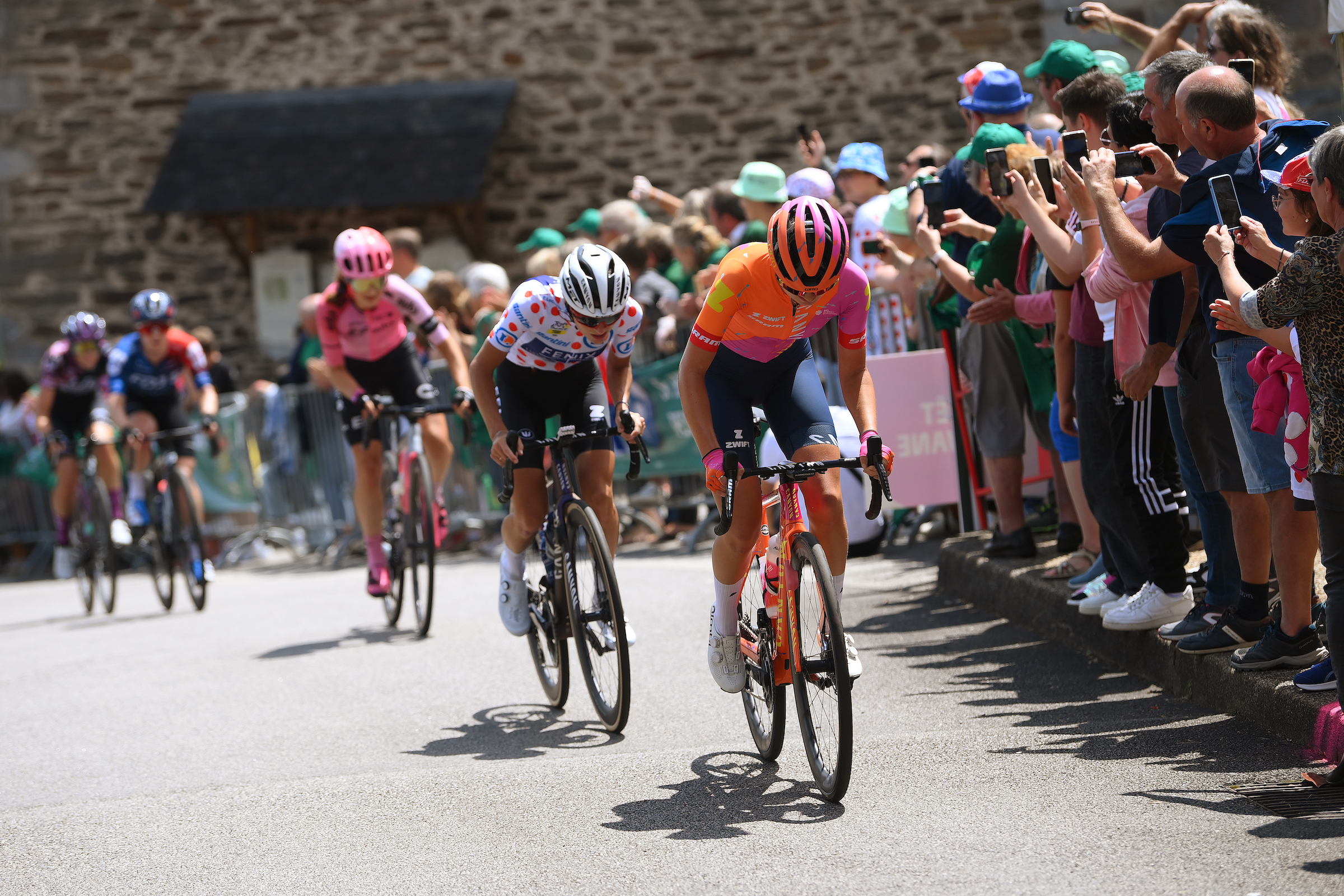
Alice Towers (Canyon-SRAM) competes at the Tour de France Femmes 2023
CN: You helped support Kasia Niewiadoma at many races this year, including at the Tour de France. What was that experience like for you?
AT: She's a very calm, chill person. She's not demanding and has a low [key] vibe, and it's good for me, for someone who is young and finding their way. I don't feel scared to ask questions or show that I'm unsure. It's been a nice vibe working with Kasia and supporting her. It's not intimidating.
CN: Your family came to watch you compete at the Tour de France, what was that like?
AT: My brother was racing but my dad drove down from Darbyshire to Pau and he was at the Tourmalet [stage 7] and the time trial [stage 8]. He was part of some of the crowd parties.
The first bike race I ever went to was at the Tour de France when the Grand Depart was in Yorkshire. That was the first race I ever watched, and we just drove out and stopped somewhere out on the course to watch. That's what my dad did on the Tourmalet.
He was going to bring my mom [Sam], but she's stuck in with our dog [Lottie], so sadly, she couldn't come; we need to get my dog a passport so she can come to the races, too.
CN: Did you ever think you would do this professionally when you were 16?
AT: Absolutely not. I wouldn't have thought I'd have raced the Worlds or won Nationals and been on a World Tour team for three years. It's happened so quickly.
The me at 16 would probably look at someone like me now and think, that's amazing.
I need to be reminded of that sometimes. I need to step back and think about how it's all been quite a whirlwind and appreciate where I am and the people around me.
It's been crazy, and that's partly why I don't think too far into the future or to the end of 2025 when my contract finishes. It wasn't long ago that I was still at school and not even riding full-time. Who knows what will happen, so I'm quite excited for the future.
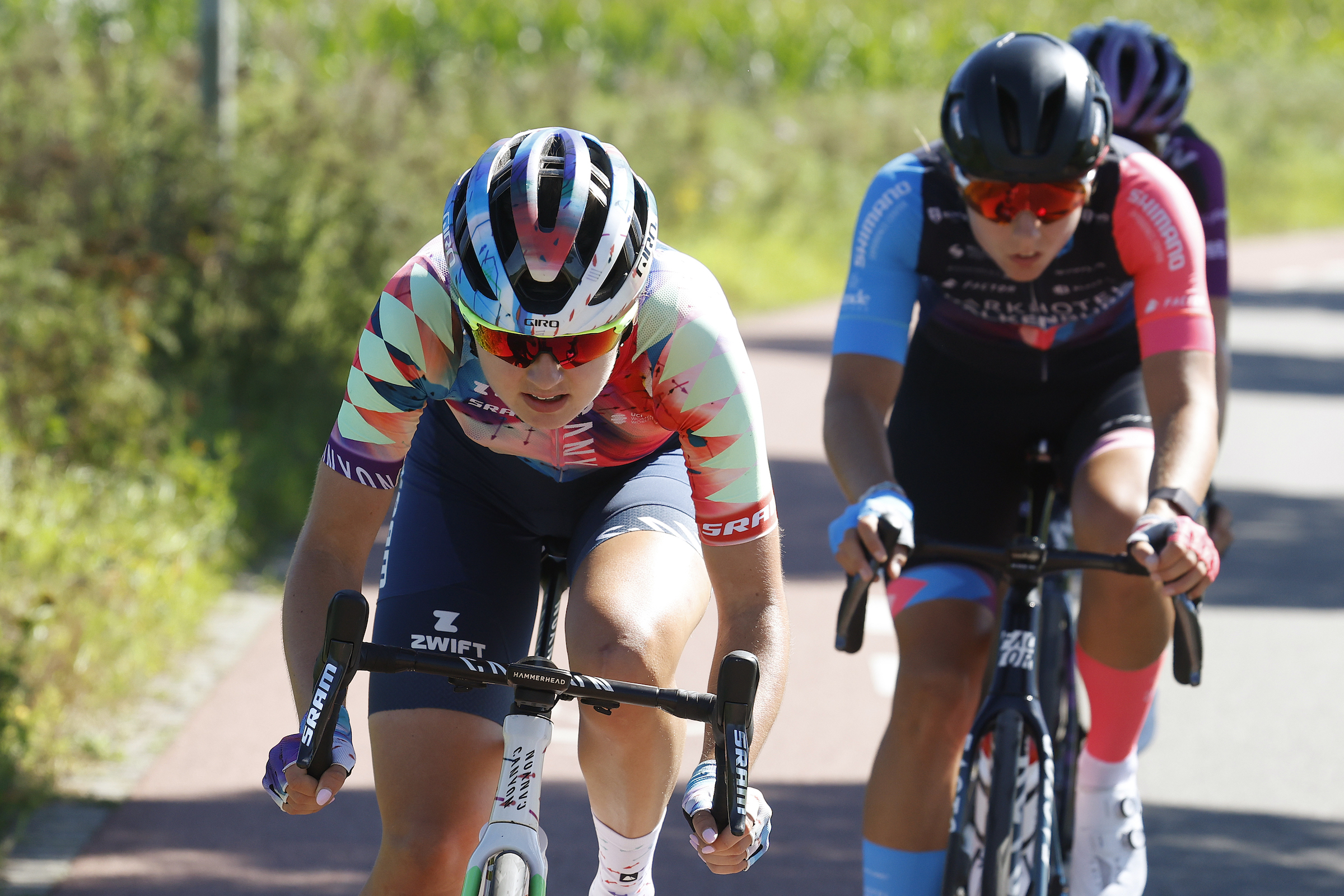

{kiosq_button:center}







